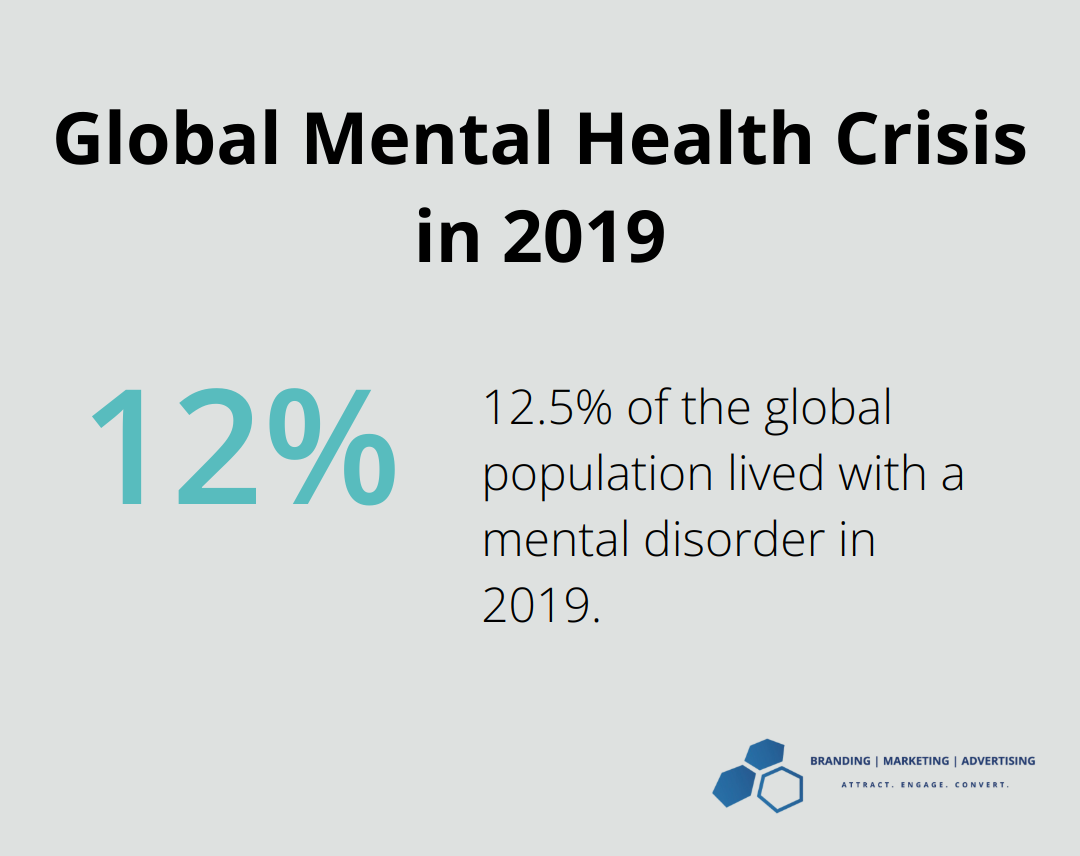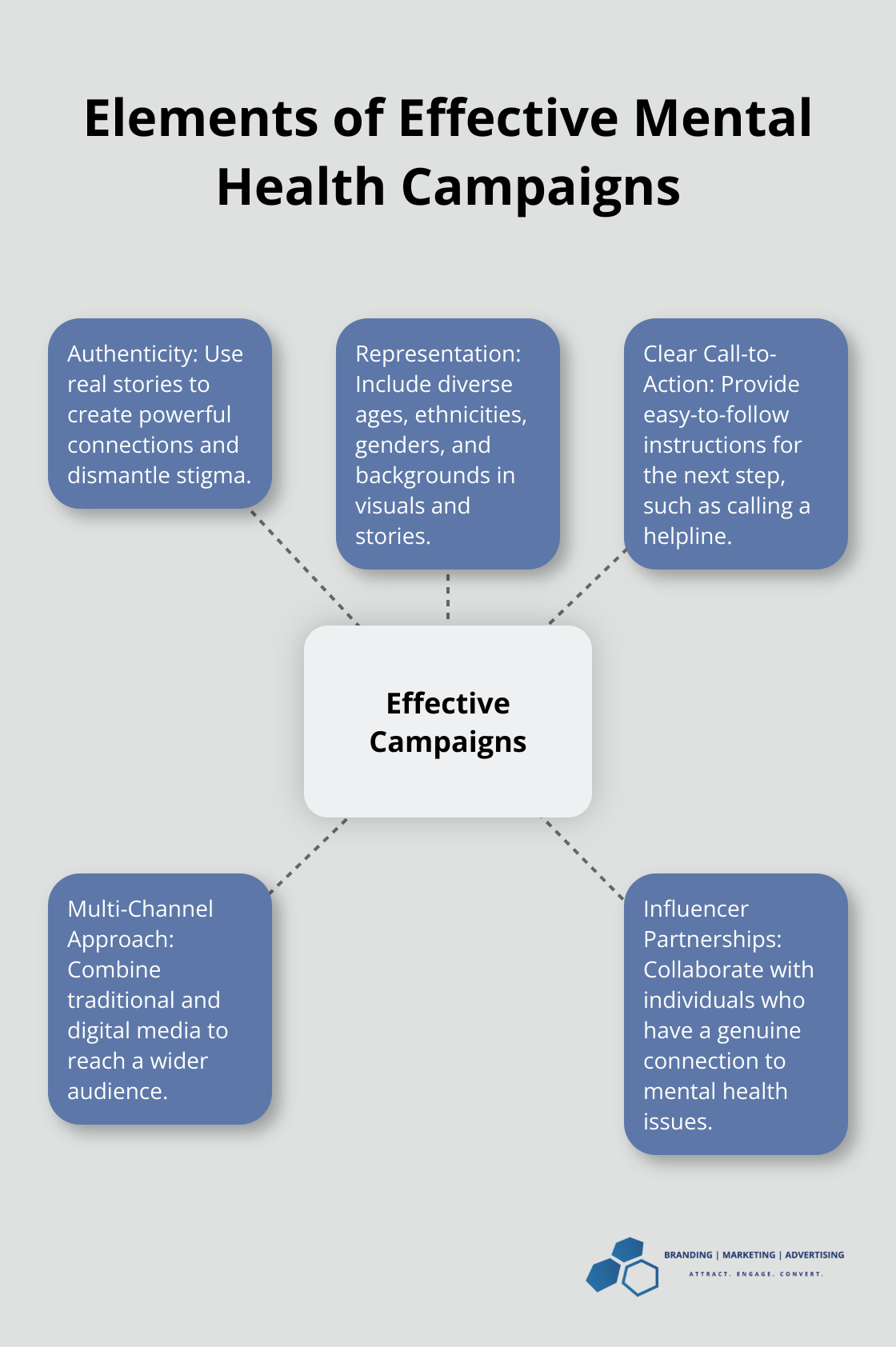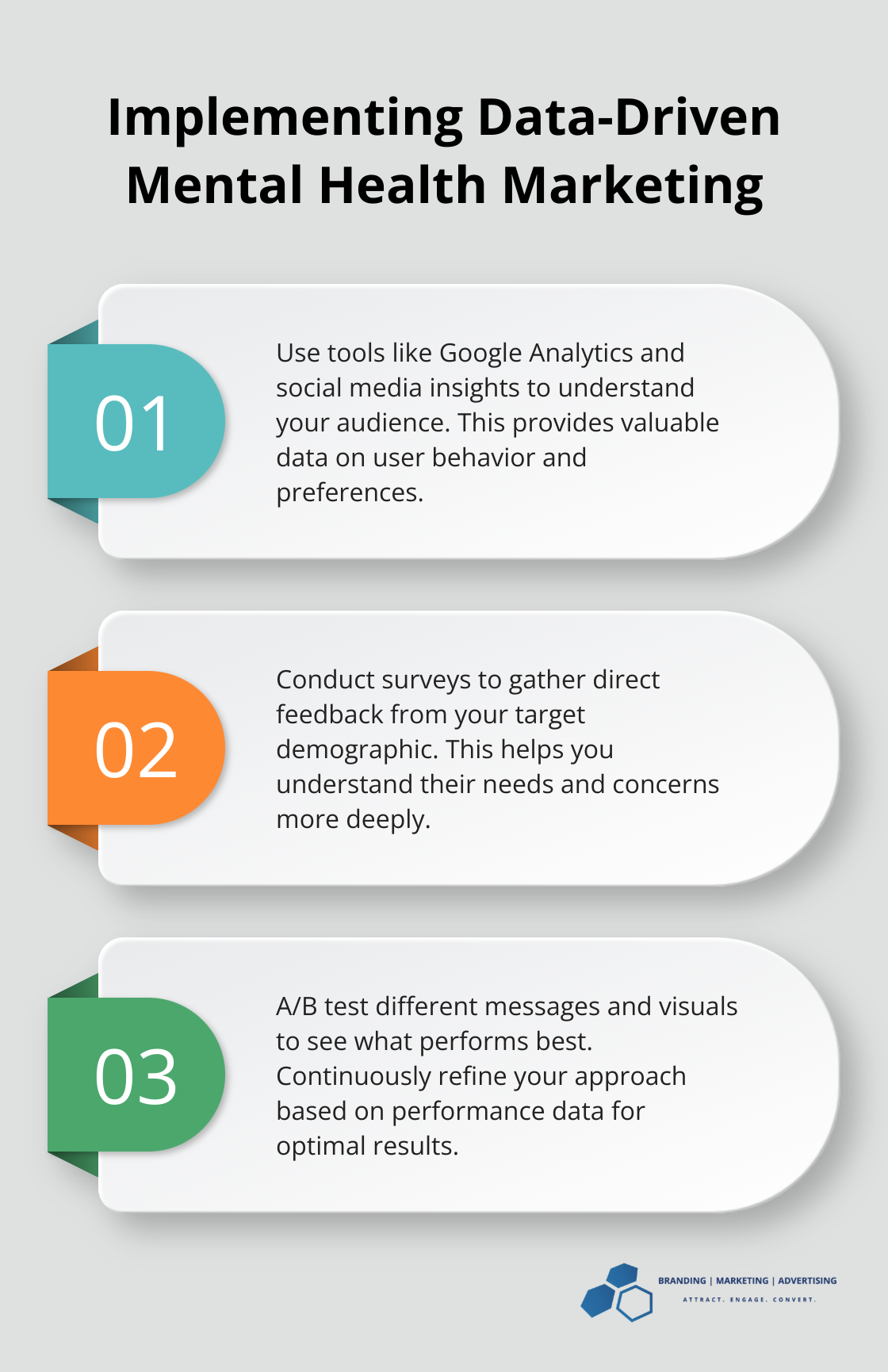How to Create Effective Mental Health Marketing Campaigns
Mental health marketing campaigns have become increasingly important in today’s society. At Branding | Marketing | Advertising, we recognize the power of effective communication to break stigmas and raise awareness about mental health issues.
Our expertise in crafting impactful campaigns can help organizations reach those in need and promote positive change. This blog post will guide you through the essential elements and strategies for creating successful mental health marketing initiatives.
Why Mental Health Marketing Matters
Mental health marketing is more than just a trend-it’s a necessity in today’s world. The power of effective campaigns to transform lives and communities cannot be overstated.
The Growing Mental Health Crisis
Mental health issues continue to rise globally. In 2019, 970 million people globally were living with a mental disorder, with anxiety and depression being the most common. This staggering statistic underscores the urgent need for increased awareness and support.

Effective campaigns address this crisis head-on. They focus on creating content that educates the public about common mental health conditions, their symptoms, and available treatments. This approach helps individuals recognize when they or their loved ones might need support.
Breaking Down Barriers
Stigma remains one of the biggest obstacles to seeking mental health care. False beliefs about mental illness can cause problems for people with mental health conditions.
Well-crafted messaging tackles this issue by normalizing mental health discussions. Campaigns that feature real stories from individuals who’ve sought help showcase the positive outcomes of treatment. This approach helps viewers relate to the content and feel less alone in their struggles.
Empowering Communities
Effective mental health marketing doesn’t just impact individuals-it transforms entire communities. When more people understand mental health, they become better equipped to support those around them.
This ripple effect comes to life through community-based campaigns. Partnerships with local organizations and influencers create tailored content that resonates with specific demographics. This localized approach leads to higher engagement rates and more meaningful conversations about mental health within communities.
Measuring Impact
Data plays a crucial role in ensuring campaigns make a real difference. Metrics like engagement rates, website traffic, and helpline calls help measure the reach and effectiveness of content.
For example, a recent campaign led to a 30% increase in calls to a local mental health hotline. This tangible impact drives the continuous refinement of strategies to create even more powerful mental health marketing initiatives.
The Role of Digital Marketing
Digital marketing plays a pivotal role in mental health awareness campaigns. Social media platforms provide powerful tools to reach and engage target audiences. These platforms allow for targeted advertising, community building, and real-time interaction with users.
Content marketing strategies help educate the public about mental health issues. These strategies also improve search engine visibility, making it easier for people to find reliable mental health information online.
Email marketing campaigns can deliver personalized mental health resources directly to subscribers’ inboxes. This direct approach ensures that important information reaches those who need it most.
Search engine optimization (SEO) techniques help mental health organizations appear in search results when people look for help online. By optimizing websites and content for relevant keywords, these organizations increase their visibility and reach more individuals in need.
The next chapter will explore the key elements that make mental health marketing campaigns successful, building on the foundation of why these campaigns matter so much in today’s society.
What Makes Mental Health Marketing Campaigns Effective?
At Branding | Marketing | Advertising, we understand the power of well-crafted mental health marketing campaigns. Success hinges on creating content that deeply resonates with your audience while providing clear pathways to support.
Authenticity: The Foundation of Trust
Insincerity stands out, especially when addressing sensitive topics like mental health. Authenticity must form the core of every campaign. Real stories from individuals who have faced mental health challenges create powerful connections and help dismantle stigma.
The National Alliance on Mental Illness (NAMI) “You Are Not Alone” campaign exemplifies this approach. By featuring personal narratives from people living with mental health conditions, NAMI humanizes the issue and encourages others to seek help.

Representation: Reflecting Diversity
Mental health issues affect people from all walks of life, and your campaigns should mirror this diversity. Include a range of ages, ethnicities, genders, and socioeconomic backgrounds in your visuals and stories.
The Heads Together campaign, led by the British Royal Family, excels in this aspect. They showcase a wide array of individuals sharing their mental health experiences, from celebrities to everyday people.
Clear Call-to-Action: Guiding the Next Step
Every effective mental health marketing campaign requires a clear call-to-action (CTA). What action do you want people to take after engaging with your content? Whether it’s calling a helpline, visiting a website for more information, or scheduling an appointment, your CTA should stand out and offer easy-to-follow instructions.
Clear CTA buttons help increase conversion rates, whether it’s booking a session or accessing resources.
The Crisis Text Line uses a simple yet powerful CTA: “Text HOME to 741741.” This clear instruction has helped countless individuals in crisis receive immediate support.
Multi-Channel Approach: Maximizing Reach
To amplify the impact of your mental health marketing campaigns, adopt a multi-channel approach. People consume information differently, so it’s important to meet them where they are.
Combine traditional media (TV and print) with digital channels (social media, email marketing, and search engine optimization). This comprehensive strategy ensures your message reaches a wider audience.
The “Time to Change” campaign in the UK successfully employed this approach, blending TV ads, social media content, and community events to reach millions and shift attitudes about mental health.
Influencer Partnerships: Amplifying the Message
Collaborating with influencers can significantly boost your message. Seek individuals who align with your campaign’s values and have a genuine connection to mental health issues.
The #HereForYou campaign on Instagram partnered with various influencers to share their mental health stories, reaching millions of users and igniting important conversations.
As we move forward, we’ll explore strategies for creating impactful mental health marketing campaigns that drive real change and make a lasting difference in people’s lives.
How to Create Powerful Mental Health Marketing Strategies
Creating impactful mental health marketing campaigns requires a strategic approach that combines expertise, authenticity, and data-driven insights. We’ve developed effective strategies to help organizations make a real difference in mental health awareness and support.
Collaborate with Mental Health Experts
Partnering with mental health professionals and organizations ensures that your messaging is accurate, sensitive, and aligned with current best practices in mental health care.
The National Institute of Mental Health (NIMH) often collaborates with marketing agencies to create public awareness campaigns. Their “Real Men. Real Depression” campaign, developed in partnership with mental health experts, successfully challenged stereotypes and encouraged men to seek help for depression.
To implement this strategy:
- Identify reputable mental health organizations in your area
- Reach out to mental health professionals for content review and expert quotes
- Invite mental health advocates to participate in campaign planning and execution
Harness the Power of Personal Stories
User-generated content and testimonials provide authentic, relatable experiences that resonate with audiences and help reduce stigma.
The “Time to Talk” campaign by Time to Change effectively used this approach. They encouraged people to share their mental health stories on social media using the hashtag #timetotalk. This strategy generated thousands of personal narratives, creating a supportive online community and normalizing conversations about mental health.
To leverage user-generated content:
- Create a dedicated hashtag for your campaign
- Encourage followers to share their stories on social media
- Feature selected stories on your website or in marketing materials
- Ensure proper consent and privacy measures are in place
Use Data to Target Your Message
Analyzing search trends, social media engagement, and website analytics can reveal what topics resonate most with your audience and how they prefer to consume information.
Google Trends shows that searches for “mental health apps” have increased over the past five years. This insight could inform a campaign focusing on digital mental health resources.
To implement data-driven strategies:
- Use tools like Google Analytics and social media insights to understand your audience
- Conduct surveys to gather direct feedback from your target demographic
- A/B test different messages and visuals to see what performs best
- Continuously refine your approach based on performance data

Engage Your Audience with Interactive Elements
Incorporating interactive elements like quizzes or self-assessments can significantly boost engagement and provide valuable information to users. These tools not only educate but also encourage active participation in mental health awareness.
Mental Health America’s online screening program offers free, anonymous mental health screenings, providing users with immediate feedback and resources. This interactive approach has helped millions of people take the first step in assessing their mental health.
To create effective interactive content:
- Develop quizzes or assessments based on validated mental health screening tools
- Ensure all interactive elements are mobile-friendly
- Provide clear next steps or resources based on user responses
- Regularly update content to reflect current mental health information and trends
These strategies can help organizations create mental health marketing campaigns that not only raise awareness but also provide tangible support and resources to those in need. The goal is to inform, inspire action, and foster a supportive community around mental health.
Creating valuable content for mental health audiences is essential for effective campaigns. Additionally, mastering healthcare social media marketing can significantly amplify your message. For those looking to market your mental health practice effectively, these strategies provide a solid foundation.
Final Thoughts
Mental health marketing campaigns transform lives and communities through authenticity, diverse representation, and clear calls-to-action. These initiatives amplify their reach with multi-channel approaches and collaborations with mental health professionals. Personal stories and data-driven insights create powerful campaigns that provide tangible support to those in need.
Sensitivity and accuracy remain paramount when addressing mental health issues in marketing. Campaigns must balance information and empathy without sensationalizing or oversimplifying complex topics. The mental health landscape evolves constantly, requiring marketers to stay informed about current trends, research, and best practices.
Branding | Marketing | Advertising helps organizations craft effective mental health marketing campaigns. Our expertise in digital marketing and understanding of mental health enables us to create strategies that resonate and drive positive change. We work towards a future where society understands, supports, and prioritizes mental health for all.












